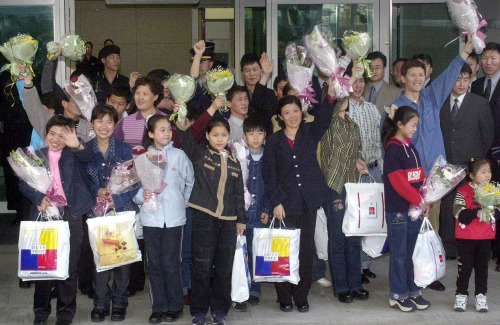Number of North Koreans defecting to the South expected to reach 20,000 by October
South Korea, boasting a population of almost 50 million, could hardly call itself crowded by the 20,000 or so defectors from North Korea.
But then again, 20,000 is enough to form a small town -- a “gun”-- here.
Whichever way the numbers are received, it reflects a significant annual increase in those fleeing the North for the South.
Most defectors in the past came alone and were mainly men, but this appears to be changing.
“More women are coming to the South, and their families also are defecting,” said one Unification Ministry official.
South Korea, boasting a population of almost 50 million, could hardly call itself crowded by the 20,000 or so defectors from North Korea.
But then again, 20,000 is enough to form a small town -- a “gun”-- here.
Whichever way the numbers are received, it reflects a significant annual increase in those fleeing the North for the South.
Most defectors in the past came alone and were mainly men, but this appears to be changing.
“More women are coming to the South, and their families also are defecting,” said one Unification Ministry official.

The percentage of women defectors surpassed men as of 2002, taking up more than 70 percent of North Koreans seeking asylum in the South.
Officials and experts said more North Koreans were risking everything to cross the border because they were hearing more about the relatively affluent economic conditions of South Korea.
But despite the growing volume of defectors, many still struggle to become fully integrated South Korean citizens.
“Legally, they can become South Koreans, but there is such a wide variety of factors that block the way for the defectors in becoming true citizens of the South,” said Kim Yong-hyun, assistant professor of North Korean Studies at Dongguk University.
The lack of facilities for educating and training is one factor, he pointed out.
Hanawon, a state-run resettlement center for defectors that opened in Anseong, Gyeonggi Province, in 1999, is virtually the such institute. Hanawon can accommodate up to 1,000 defectors at a time under a 12-week program designed to help them get accustomed to South Korean society.
The government plans to build a second Hanawon by 2012. Construction is scheduled to start in March to be built in Gangwon Province.
While Seoul no doubt has sought to take care of the defectors and give them a new life, its resources are too scant to adequately deal with the growing number of North Koreans choosing to skip south.
Almost 3,000 North Koreans fled south last year, up from the 2,800 in 2008.
As of this month, there were 19,300 defectors, according to figures from the Unification Ministry. The tally is likely to exceed 20,000 by October, officials said.
In sharp contrast, just eight North Koreans defected to South Korea in 1993.
“When it thinks about reunification, South Korea needs to really plan this out and get the government and private sector together to draw up comprehensive plans for helping defectors,” Kim said.
The government hands over a significant amount of money to offset resettlement costs, but many fail to gain financials stability, because they are far from educated in the ways of a competitive capitalist society.
As part of measures to help the defectors become economically self-reliant, the Unification Ministry said it aims to create up to 30 social companies operated by those coming from the North.
Social companies are firms whose main goal is to reap profits so as to re-invest the money in society to help address social problems such as unemployment.
The money at these newly formed companies will therefore be used to educate more defectors and improve their welfare.
Critics, however, point out that these companies usually are very much reliant on the government, and that the jobs are not self sustaining.
Social perception towards refugees from North Korea also needs to change, experts point out. Most defectors face severe prejudice from South Koreans. “There is still much stigma attached to being a defector here,” said Kim.
This is part of the reason why the unemployment among North Korean defectors has soared as high as 13.7 percent. South Korea‘s jobless rate is at around 4 percent.
Further, some schools refuse to admit refugees, mostly because the parents are concerned of the influence they may have on their children.
Some of these concerns are warranted, considering the intermittent cases of espionage by North Koreans posing as defectors.
One female spy who attained significant confidential information from serviced members had toured the nation giving lectures on her life as defector and teaching the military on North Korea.
It was only recently that South Korea arrested spies who were sent to assassinate Hwang Jang-yop, the former Workers’ Party secretary.
Other issues between the two Koreas need to be sorted out as well, including the sinking of the Cheonan in March.
Seoul claims that the North was culpable for sinking the Navy corvette and killing 46 of the sailors aboard, but the North denies any involvement.
Thawing inter-Korean relations are expected to be another important factor in the status of defectors, those close to the matter said.
By Kim Ji-hyun (jemmie@heraldcorp.com)









![[Kim Seong-kon] Democracy and the future of South Korea](http://res.heraldm.com/phpwas/restmb_idxmake.php?idx=644&simg=/content/image/2024/04/16/20240416050802_0.jpg&u=)







![[KH Explains] Hyundai's full hybrid edge to pay off amid slow transition to pure EVs](http://res.heraldm.com/phpwas/restmb_idxmake.php?idx=652&simg=/content/image/2024/04/18/20240418050645_0.jpg&u=20240418181020)

![[Today’s K-pop] Zico drops snippet of collaboration with Jennie](http://res.heraldm.com/phpwas/restmb_idxmake.php?idx=642&simg=/content/image/2024/04/18/20240418050702_0.jpg&u=)